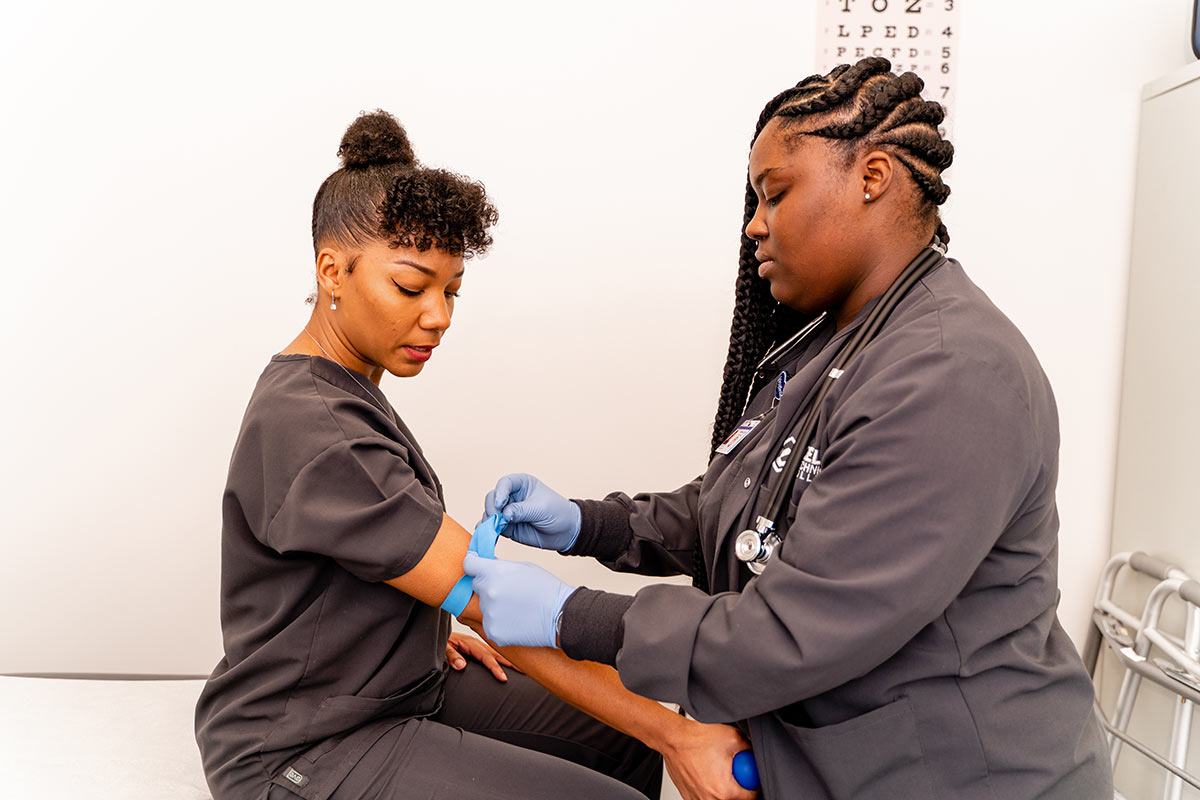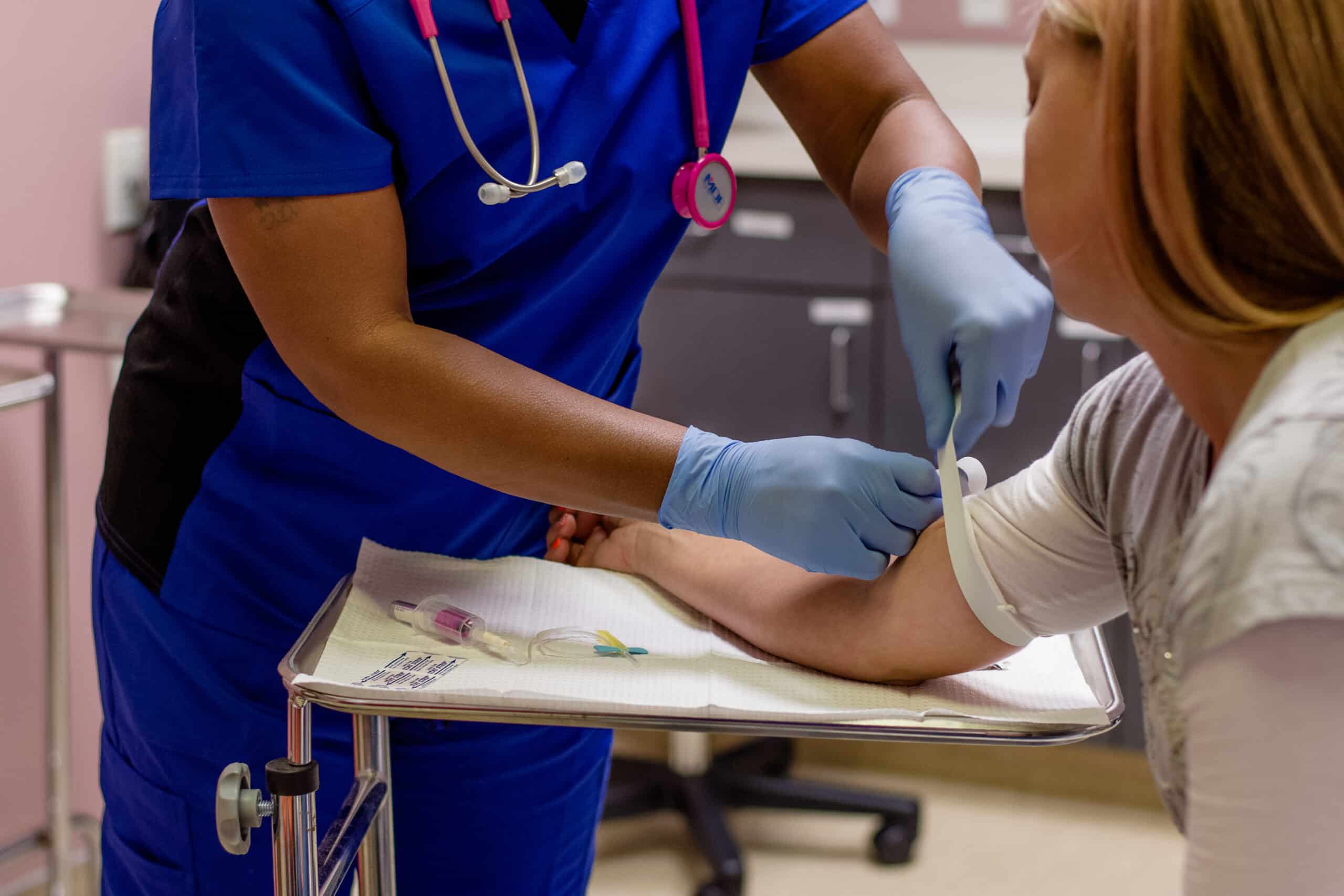The Course to Certification: Comprehending the Phlebotomy Educating Training Course Trip and Its Importance
As you consider the path to qualification in phlebotomy, it's vital to understand the duty you'll play in health care. Your training will cover important skills, from blood collection strategies to patient communication.

The Role of Phlebotomists in Healthcare
Phlebotomists play an essential duty in the healthcare system, working as the essential web link in between clients and essential analysis testing. You'll do blood draws, making certain samples are gathered precisely and securely. Your experience assists in diagnosing clinical problems, keeping an eye on health, and guiding treatment choices.
In your everyday communications, you'll need to develop trust with individuals, making them really feel comfortable during what may be a stressful experience. You are in charge of labeling and managing examples thoroughly to stop contamination or mistakes, which could impact examination results.
Past this, you'll often work alongside doctors and nurses, communicating vital info concerning people' problems. By understanding your abilities, you add meaningfully to individual treatment, making you a vital component of the clinical team.
Summary of Phlebotomy Training Programs
When checking out phlebotomy training programs, you'll discover various types designed to fit various timetables and finding out designs. Each program assists you establish vital skills like blood collection and patient communication. Recognizing these choices is crucial to selecting the right course for your job.
Kinds of Educating Programs
A number of kinds of training programs are offered for those looking to come to be skilled in phlebotomy. In addition, some medical facilities and facilities provide on-the-job training programs, supplying practical experience while you discover. Whatever course you pick, each program aims to furnish you with the essential skills for a successful phlebotomy job.

Key Skills Established
Grasping phlebotomy needs a collection of vital abilities that are created via comprehensive training programs. You'll discover technical skills like appropriate capillary choice, needle insertion, and blood collection strategies. These hands-on techniques assure you can perform treatments securely and successfully. In addition, interaction abilities are basic; you'll require to connect with people, clarify treatments, and placed them at simplicity. Comprehending composition and physiology is vital, as well, as it helps you locate veins and understand the body's response to blood attracts. Lastly, you'll get understanding of security protocols and infection control, ensuring you maintain a sterile setting. Each of these abilities is vital for your success as a qualified phlebotomist, making you a valuable property in any type of healthcare setup.
Trick Components of a Phlebotomy Training Course
In a phlebotomy course, you'll concentrate on vital subjects that prepared for your future job. You'll participate in hands-on training that enables you to use what you've found out in real-world settings. Both the curriculum and sensible experience are important for your success as a phlebotomist.
Curriculum Overview
While going after a phlebotomy training program, you'll experience a core educational program made to furnish you with basic abilities and knowledge. Phlebotomy Classes Near Me. This curriculum commonly includes composition and physiology, concentrating on the blood circulation system and understanding blood components. You'll additionally discover various kinds of blood collection techniques, consisting of venipuncture and capillary slit strategies
Additionally, infection control and safety protocols are essential components, guaranteeing you understand just how to preserve a sterilized environment. You'll study patient communication, highlighting communication and empathy, which are critical for reducing individual stress and anxiety.
Hands-On Training Experience
Getting hands-on experience is a vital part of your phlebotomy training program. This functional training enables you to apply what you have actually found out in a real-world setup, boosting your abilities and confidence. Phlebotomy Courses Near Me.
Furthermore, you'll obtain the possibility to connect with clients, which is crucial for establishing your interaction skills. This mix of technical effectiveness and interpersonal abilities is critical for your success as a licensed phlebotomist. Inevitably, hands-on training is where theory satisfies technique, solidifying your understanding and preparedness for qualification.
Accreditation and Licensing Demands
Prior to you can begin your job in phlebotomy, it is vital to comprehend the qualification and licensing requirements that vary by state. Many states require phlebotomists to hold an accreditation from an identified company, such as the National Phlebotomy Association or the American Society for Scientific Pathology. These qualifications typically involve passing an examination that checks your expertise and abilities in the field.
Along with accreditation, some states have certain licensing demands. You might require to finish a particular variety of hours in professional technique, send evidence of training, or undertake a history check. It is necessary to investigate your state's laws to ensure you meet all needed criteria.
Remaining notified concerning these needs not only aids you secure a setting however also enhances your integrity as an expert. By satisfying these requirements, you'll be well on your way to a successful job in phlebotomy.
Hands-On Training and Practical Experience
Hands-on training and sensible experience are essential parts More Info of your phlebotomy education and learning, as they enable you to apply theoretical expertise in real-world scenarios. Throughout your training, you'll engage in supervised venipuncture, find out correct methods, and become knowledgeable about numerous blood collection devices. This direct involvement is critical for constructing your self-confidence and developing your skills.
You'll function carefully with experienced specialists who can guide you via the nuances of individual interaction and example handling. Each practice session not just enhances your understanding but also prepares you for the busy environment of medical care settings.
Additionally, several programs integrate clinical turnings, allowing you to experience varied settings, from hospitals to outpatient centers. This exposure assists you adjust to different challenges and client needs, ensuring you're well-prepared for your future duty. Welcome these possibilities, as they're necessary to becoming a competent and caring phlebotomist.
Obstacles Dealt With During Training
While getting hands-on experience is essential, it's crucial to recognize the difficulties that can occur during your phlebotomy training. You could experience anxiousness when performing procedures on actual patients, particularly if you're brand-new to the setting. The pressure to get whatever right can be frustrating. look here In addition, understanding the skills required for blood attracts takes technique; you might struggle with method at first.
Time administration can likewise be a difficulty, as balancing concept, functional sessions, and personal dedications can really feel daunting. You may face differing learning paces among your peers, resulting in feelings of self-doubt if you think you're falling back. Adjusting to the various characters of trainers can be challenging, as each may have an one-of-a-kind training design.
Acknowledging these challenges early can prepare you for success and assist you establish resilience throughout your training journey.
Job Opportunities After Qualification

As you get experience, you might even take into consideration focusing on locations like pediatric or senior citizen phlebotomy, satisfying certain patient requirements. Some phlebotomists pick to advance their occupations by becoming lab technicians or going after more education in health care areas.
Additionally, your accreditation can bring about roles in training or overseeing brand-new phlebotomists, allowing you to share your knowledge. With site the health care sector continually growing, your skills will certainly always remain in demand, leading the means for a steady and meeting profession. Accept the possibilities waiting for you!
Frequently Asked Concerns
What Is the Typical Duration of a Phlebotomy Educating Training Course?
Phlebotomy training programs typically last around four to eight weeks. You'll participate in hands-on method, class guideline, and on-line learning. Completing this training prepares you for accreditation and a fulfilling job in healthcare.
Are Online Phlebotomy Courses Available?
Yes, online phlebotomy courses are available. They provide versatility and benefit, enabling you to study at your own pace. Just verify the program is certified to meet certification requirements and gain valuable abilities for your job.
Just How Much Does Phlebotomy Training Commonly Price?
Phlebotomy training normally sets you back between $700 and $2,500, depending on the program and location. You should consider variables like training course length, included products, and hands-on experience when picking the ideal training for you.
What Are Common Requirements for Phlebotomy Training?
Common prerequisites for phlebotomy training often consist of a secondary school diploma or GED, booster shots, and a background check. Some programs might likewise call for fundamental medical care understanding or certifications, guaranteeing you're prepared for hands-on training.
Can I Work While Finishing My Phlebotomy Training?
Yes, you can work while finishing your phlebotomy training. Several trainees equilibrium tasks with their researches, but ensure to manage your time successfully to guarantee you satisfy both job and training commitments effectively.